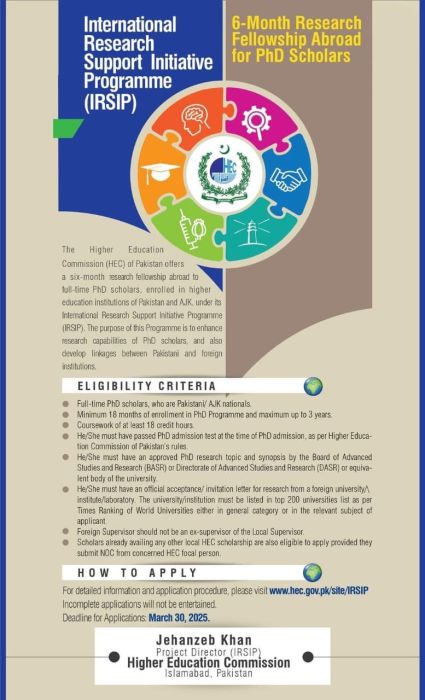36/25 How Pakistan is Investing in Collaborative Research? IRSIP an Impressive Opportunity for Ph.D. Scholars.
Posted 11 months ago
The International Research Support Initiative Programme (IRSIP) is not merely a scholarship but a strategic investment in the country's intellectual future. By facilitating six-month research fellowships abroad for PhD scholars, the program bridges the gap between local and international academia, fostering innovation and collaboration.
Initiatives like IRSIP are essential for a developing nation striving to cement its place in the knowledge economy. Researchers' ability to engage with global institutions, access cutting-edge resources, and collaborate with world-renowned scholars enhances their capabilities and strengthens Pakistan's research ecosystem. This program ensures that promising scholars gain exposure to world-class laboratories, emerging technologies, and innovative methodologies that can, in turn, revolutionize research back home.
A Merit-Based Gateway to Interact With Global Academia
What sets IRSIP apart is its stringent eligibility criteria, which ensure that only the most committed and high-achieving scholars benefit. To qualify, applicants must be full-time PhD students enrolled in Pakistani or AJK institutions, with at least 18 months and no more than three years of doctoral studies completed. The minimum requirement of 18 credit hours of coursework and an approved research topic further reinforces the program's focus on academic rigor. The application process involves submitting a detailed research proposal, academic transcripts, and letters of recommendation from local advisors.
Moreover, the foreign university or host research institute must be ranked among the top 200 in the Times Higher Education World University Rankings to maintain transparency and global credibility. This criterion ensures that scholars are placed in institutions with a strong research culture, guaranteeing quality mentorship and exposure to transformative academic environments. Notably, the program also mandates that foreign supervisors be independent of the scholar's local advisors, preventing conflicts of interest and fostering fresh academic perspectives.
IRSIP is not just a program, it's a strategic step towards research excellence. It's a part of a larger mission to shape a generation of academically proficient and globally competitive researchers.The impact of such international fellowships extends beyond individual scholars. When researchers return to Pakistan, they bring back knowledge, networks, methodologies, and a renewed academic culture. Many alums of similar exchange programs have successfully established collaborations, initiated cross-border research projects, and contributed to policy frameworks in their respective fields.
Additionally, the IRSIP program accommodates scholars already availing of other local HEC scholarships, making it an inclusive initiative that recognizes students' diverse financial and academic circumstances. This move reflects the commission's commitment to reducing barriers to global exposure, a crucial step in leveling the playing field for scholars from varying socio-economic backgrounds.
Sustained Support and Strengthening Local Research Infrastructure
Prof. Dr. Muhammad Mukhtar praised the initiative and urged increased funding for research, infrastructural development in local universities, and industry-academia collaborations to ensure returning scholars have the resources they need to implement their learnings effectively.
Furthermore, creating platforms where these scholars can share their experiences and mentor younger researchers will amplify the impact of this initiative.
With the application deadline set for March 30, 2025, PhD scholars across Pakistan have a remarkable opportunity to advance their research at leading global institutions. As the country strides towards a knowledge-driven future, programs like IRSIP will play a critical role in shaping a generation of academically proficient and globally competitive researchers.
Pakistan's future in science, technology, and innovation depends on how well it cultivates and retains its intellectual capital. By investing in its brightest minds today, the nation is laying the groundwork for a more innovative and globally connected tomorrow.





